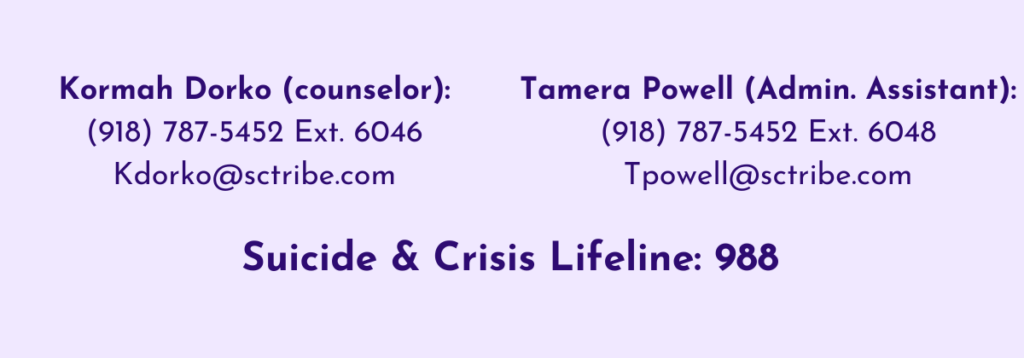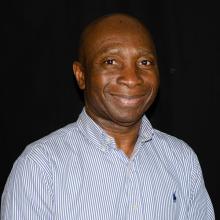The Substance Abuse Program might just be the most important and underutilized resource the Seneca-Cayuga Nation provides—not just to our own Tribal Members, but to any member of a federally-recognized Tribe. This free program is run by veteran counselor, Kormah Dorko, with great help from Administrative Assistant, Tamara Powell. Together, they are able to offer a comprehensive list of services, from alcohol & drug education, to referrals, to prevention & early intervention tactics.
Mr. Dorko began working for SCN in 2018, his latest position in a counseling career that began back in 2005. Since taking the reins, Mr. Dorko’s primary focus has been assisting people with anxiety, depression, and substance abuse issues.
The approach I take is integrative… We treat every person as an individual, with unique needs and circumstances,” said the counselor during a recent interview. “You could need to use cognitive therapy with some people, and EMDR (Eye Movement Desensitization and Reprocessing) with others.”
One of the major goals of SAP this year is to resurrect a substance abuse prevention and community outreach program known as BABES, or Beginning Alcohol (and Addiction) Basic Education Services. The program, which has been on pause for several years, serves as early intervention for children from 3rd to 5th grade. The aim is to teach children about tranquility, calming techniques, and better coping skills in the face of adversity. Eventually, Mr. Dorko hopes to expand after school programs and prevention activities for children of all ages.
In the meantime, the counselor also helps facilitate a summer camp geared towards young adolescences within a 50-mile radius of Sky Ranch’s “Cave Springs” in Quapaw, OK. The camp’s primary focus is outreach as a preventative strategy for substance abuse, while also incorporating cultural elements. Specific goals include: increasing substance abuse awareness, reinforcing anti-drug behaviors, and providing an environment where youth can participate in alcohol and drug-free activities.
Another major facet of SAP is the awareness seminars they hold at the Substance Abuse & Counseling Center Conference room. Topics have included suicide and depression recognition, substance abuse, and managing grief.
Attending a substance abuse awareness seminar not only benefits you as an individual, it strengthens the community by raising awareness. It teaches people that substance abuse is a family and community issue, not an individual issue. Simply raising awareness can arm the community with the necessary tools that lead to higher rates of prevention and earlier intervention.
Attending a depression awareness seminar is also incredibly beneficial to the community. “There’s a common misconception that coming to counseling is a sign of weakness, but it’s not. It’s a sign of empowerment,” Kormah explains. And he believes the dialogue, which can help you better understand the warning signs of depression, is a great place to start empowering and changing minds.
Incredibly, if you do not have transportation to attend one of these events, SAP is willing to come to you. Community outreach is a top priority. “We don’t mind if it’s just 5 people. If they want to learn more about mental health and substance abuse awareness, they can take advantage of our program. We will come to you. And it’s totally free.”
It’s important to note that all of these services are available to Members of all ages, including adolescences. For members who need treatment beyond what SAP can provide, Mr. Dorko is also able to make referrals to in-patient treatment facilities like Willow Crest Hospital. Ultimately, the goal is to help Tribal Members in any way possible.
SCN is a small tribe. And we face the same mental health issues that affect a disproportionate number of Native Americans, without the same resources as some of the larger Nations. That a why program like SAP is so crucial. It has the potential to make a huge impact. We just have to take advantage of it—together.

